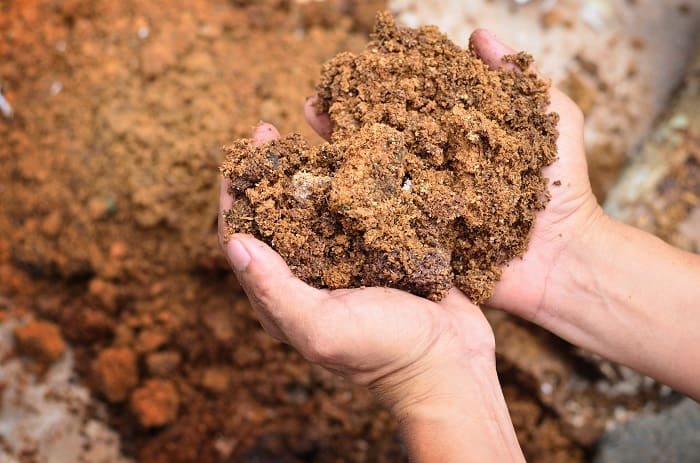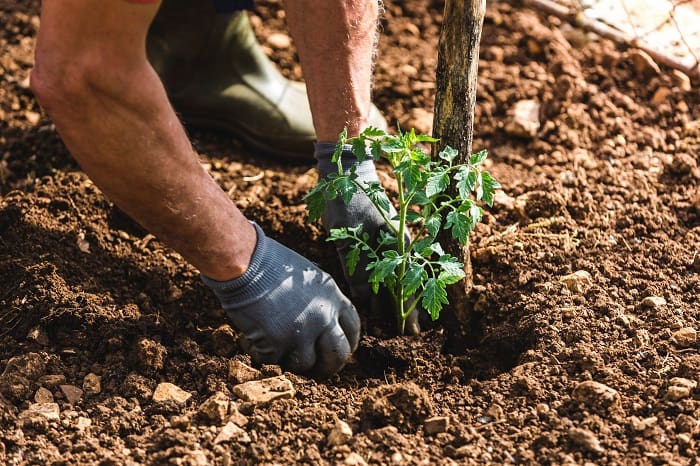In my ongoing quest for that “perfect vegetable garden”, I’m always on the lookout for new ways to improve my little patch of heaven. As it turns out, all vegetable gardens benefit from lots of compost and organic matter.
Compost adds nutrient-rich humus to the garden and encourages the growth of worms, beneficial bacteria, and other organisms that maintain the well-being of your garden
That being said, I have to confess: I detest the smell of compost! I have used it before and despite my best efforts, I haven’t been able to manage the odor. Fortunately, a reader suggested that I try mushroom compost as an alternative.
But what exactly is mushroom compost? How do you use it, and more importantly, is mushroom compost good for a vegetable garden?
Is Mushroom Compost Good for a Vegetable Garden?
I’ve been using 10 Pounds Sterilized Compost Mushroom Substrate which had the highest rating on Amazon and also had the greatest number of reviews at the time. Having purchased several bags, I rolled up my sleeves and got to work.
Mushroom compost slowly releases nutrients into the
Apart from that, mushroom compost also locks moisture into the

Ultimately, mushroom compost is perfect for nearly all flowering plants, vegetables, herbs, trees (especially fruit trees), shrubs, and even lawns. Vegetable crops such as broccoli, cauliflower, cabbage, kale, kohlrabi, and Brussels sprouts are happiest in the non-acidic environment that mushroom compost brings to the
Since mushroom compost is rich in calcium, you won’t encounter the blossom-end rot which plagues a lot of tomato growers. I planned on making some compost tea to prevent leaf mold, but according to one source, the use of mushroom compost tea is dubious at best and may even be harmful.
On a side note, I think that mushroom compost looks great with its rich, dark brown colors that speak of a healthy-looking garden.
Most importantly, mushroom compost doesn’t smell bad at all! It’s also relatively cheap compared to other traditional composts I found on the market.
What is Mushroom Compost?
Mushroom compost doesn’t contain mushrooms, even though its name suggests otherwise. Its actually the substrate left over after the process of producing mushrooms on an industrial scale.
You’ll find that mushroom compost “recipes” vary greatly and may include chopped straw, peat moss, poultry manure, cocoa shells, cottonseed or canola meal, gypsum, potash, lime, and urea. The mixture is left for a month to allow heat and bacteria to build up, eliminating traces of weeds or other pathogens.
The resulting mushroom substrate is first steam-sterilized then inoculated with edible commercial mushrooms. After a few rounds of harvesting, the bed is deemed “used up” for mushroom production and sold as compost.
Here’s an interesting video that demonstrates how Northway Mushrooms creates mushroom compost on an industrial level.
Potential Problems of Using Mushroom Compost
While you might find using mushroom compost to be useful, there are a few things you should know first. Some plants like fruit bushes and certain flowers like magnolia, heathers, and camellia are incompatible with the alkaline properties of mushroom compost and prefer a more acidic environment.
Fresh mushroom compost is rich in soluble salts that need to be leached out or cured before use. Excessive salt levels can harm germinating seeds and kill salt-sensitive plants such as rhododendrons, blueberries, and azaleas. Nutrient levels are low, however, relative to other forms of packaged garden manure, with most of the available nitrogen depleted by the mushrooms that previously used the compost.
Mushroom compost may contain large amounts of chalk which you should remove to prevent an accumulation of chalky deposits in the
Also, mushroom farmers may use chemical fertilizers or employ products such as cyromazine, diflubenzuron, methoprene, Dimlin, and Diazanon to control fungus gnats and flies. They may also use chemicals such as thiabendazole, chlorothalonil, and benomyl for fungal infections. These chemicals may find their way into commercial mushroom composts; always check with your supplier!
How is Mushroom Compost Used?
You can apply the compost evenly and uniformly from one to three-inch thickness; this was tilled into the existing
As mentioned, fresh mushroom compost can have concentrated levels of soluble salts that can be harmful to certain plants, notably germinating seeds, seedlings, and members of the heath family. To counter this, make sure you mix it with garden

I also had success in using mushroom compost as a mulch which was great in controlling weeds and helping my garden
FAQ’s
Can you grow vegetables in mushroom compost?
Yes, you can grow vegetables in mushroom compost. If you use a compost that has been specifically designed for vegetable gardens, you will get a good yield of healthy produce. You can grow vegetables with little to no care or maintenance. As long as you have enough water, your plants will do just fine.
It is a very simple process. You will need a small amount of mushroom compost, some well-rotted manure and some fertilizer. Why Grow Vegetables in Mushroom Compost? The answer is simple. Mushroom compost contains essential nutrients that plants need to grow properly. It is also extremely rich in nitrogen, which helps plants develop strong roots. This means that your plants will have a healthier root system, which will help them absorb more water and nutrients from the soil.
Is mushroom compost good for tomatoes?
Yes, it is. Tomatoes are a common crop in many gardens, and it is essential to have compost or mulch around the base of your plants to help protect them from slugs, snails and other pests. There is no hard and fast rule when it comes to the use of compost in a garden. There are times when compost will help to boost growth, and others when it is best to leave it out of the mix.
Tomatoes like a pH of between 6 and so the soil should be well-manured and have a pH of around before planting. A pH of around is too low for tomatoes, but if you have high levels of nutrients in your soil then this won’t be an issue. The main problem with using compost is that it tends to dry out the soil, and this can lead to root rot if not done properly.
Is mushroom compost better than regular compost?
Yes, it’s better! If you’re wondering why your plants are getting bigger and healthier after you add compost, that’s because compost is basically fertilizer. The nutrients in the compost are what’s providing the energy for the plant to grow.
So what makes mushroom compost so special? Well, mushrooms have a different life cycle than other plants do. They don’t produce seeds or flowers. Instead, they reproduce by sending out spores, or seeds. In nature, these spores are carried on the wind. In order for a mushroom to grow, it needs to find a host, or living organism, that will feed on the mushroom’s spores.
When you add mushroom compost to your garden, the spores will be attracted to the compost because it smells like food. Once they are near the compost, they will find their way to the surface of the compost and start growing. The mushrooms will continue to grow until they can reach the air. Then, they will release their spores into the air, and the cycle starts all over again. Mushrooms are amazing organisms that can help you with several things. They help break down organic matter and add nutrients to your soil. They also help attract beneficial insects to your garden, including ladybugs, hoverflies, and lacewings. They provide food for your animals, and they also keep your soil healthy and free of pests. You may be wondering what makes mushroom compost different from regular compost. There’s a couple of differences. One is that it has a higher nitrogen content than normal compost does.
It also has a higher water content. These two differences make it a much more efficient way to feed your plants. One thing that you should be aware of when you’re using mushroom compost is that the mushrooms will need to be cleaned before they’re used in the garden. Once they’ve been harvested, you’ll have to clean them. You’ll need to wash them well, because they can carry diseases that can affect your plants. However, once you’ve washed them, they’ll be safe to use.
Conclusion
I can wholeheartedly recommend mushroom compost for vegetable gardens. However, you just have to keep these pointers in mind:
- Don’t use mushroom compost with plants that prefer acidic
soil - Mix mushroom compost with garden
soil - Buy only from trusted suppliers; avoid unwanted chemicals and by-products!
The results I had from 10 Pounds Sterilized Compost Mushroom Substrate were extremely satisfying. I have a noticeable decrease in watering expenses, and most importantly, my plants and vegetables are all happy and healthy.
Please comment below and let me know if you have any questions or suggestions. My take is that if you are interested in improving the state of your vegetable garden, consider adding mushroom compost to your





